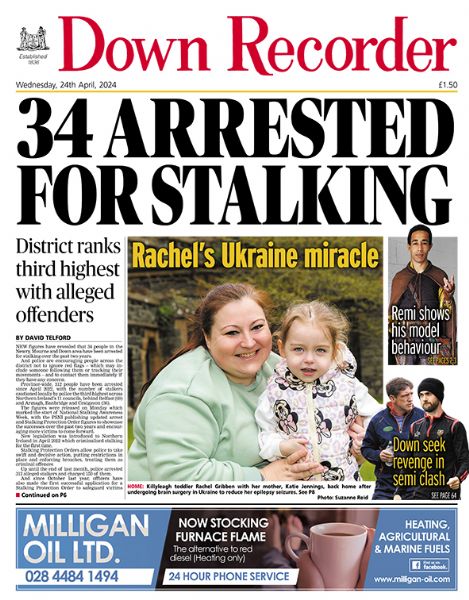Rural concerns discussed at stroke services meeting
Rural concerns discussed at stroke services meeting
26 June 2019
ARCHITECTS of the plan to reshape stroke services across the province have been urged to ensure that the needs of people in rural areas are at the forefront of their thinking.
The call was issued at a public information session in Downpatrick last week attended by Department of Health chief medical officer Dr Michael McBride and senior officials from the Public Health Agency.
Health chiefs maintain that reshaping stroke services to provide new hyperacute units will ensure patients have access to the best possible care in regional centres of excellence.
They also insist that the future direction of travel will lead to better outcomes for patients, with local health campaigners urging those behind the future direction of travel to factor the Downe Hospital into their thinking.
Campaigners are also keen to see the Downpatrick hospital used as a step down facility to assist stroke patients with their recovery after emergency treatment.
But they are concerned that the entire strategy for stroke treatment and recovery is being sold to the rural community on the strength of an improved ambulance service which the local area has required for more than three decades, but never been able to get.
There is also concern that Air Ambulance NI, whose operational costs are funded by charitable donations, will be asked to play a key role in the new stroke service.
At last week’s meeting at Downpatrick racecourse, Down Community Health Committee official Anne Trainor said campaigners had no issue with moves to ensure that stroke patients received the best possible care in a centre of excellence.
However, she said that if people across Down and rural Lecale were to benefit from the new service, current emergency ambulance response times needed to be significantly improved.
“Campaigners have major concerns about the ambulance provision aspect of the proposed new service,” said Mrs Trainor.
“We of course want what is best for stroke patients, but the problem we have at the minute is that Down District has the second worst emergency ambulance response times in Northern Ireland. This needs to change.”
Mrs Trainor said health campaigners understand the need to reshape stroke services, but warned that to place increasing emphasis on ambulance provision, the infrastructure needed to deliver the proposed new service must be in place.
“We need a fast and effective ambulance service that can get stroke patients to where they need to be. We live is a dispersed rural area and there must be adequate ambulance provision to transport people to the proposed hyperacute stroke units,” she said.
“I believe it is unfair to use the air ambulance as part of the new model of care given that it is largely funded by charitable donations. It’s an issue which the panel of experts who attended last week’s consultation meeting agreed with me on.”
While she did not get an opportunity to put forward the Downe Hospital’s case to be recognised as a so-called step down facility for recuperating stroke patients, Mrs Trainor said it must be factored into the thinking on the way forward.
“I believe this can happen in a modern new building with highly trained, professional staff who can deliver such a service for the local and wider population,” said Mrs Trainor, expressing concern that the City Hospital does not feature on the list of bases for the new hyperacute stroke units.
The health campaigner added: “The Ulster Hospital has been suggested as one of the bases, but it is located at a limited site which has been over-extended in recent years.
“It is a brilliant hospital, but could the new stroke unit not be delivered from elsewhere? Relatives of mine have had occasion to use the unit at the City which is excellent and the old adage ‘if it is not broke don’t fix it’ springs to mind”.
Mrs Trainor is also urging those behind proposed changes to breast care assessment services to organise one of the public information sessions it is organising in South Down to allow local women to have their say.
The health campaigner is also encouraging people to make written responses on the future plans for both stroke and breast assessment services. The breast assessment consultation ends on July 19, with the closing date for submission on reshaping stroke services extended until August 2.

